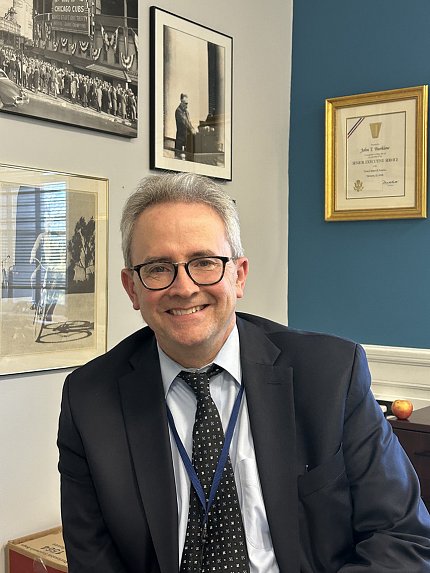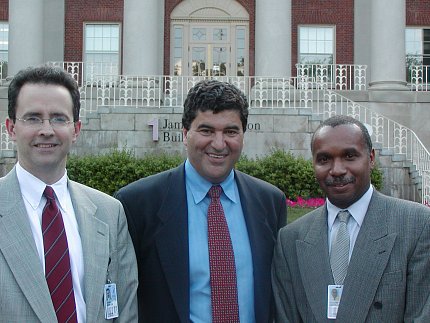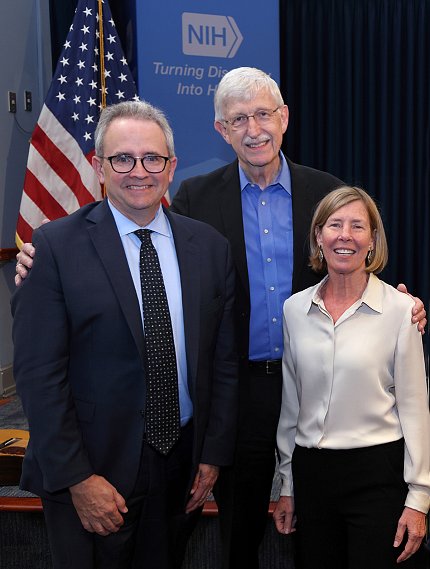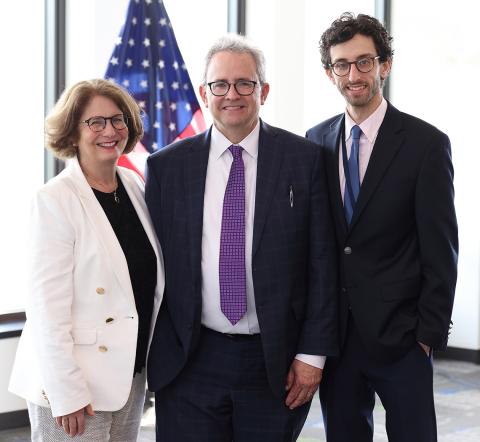NIH Chief of Staff Burklow Retires

Photo: Dana Talesnik
In April, NIH Chief of Staff John Burklow retired after 39 years of federal service, all of those years at NIH. He has been a role model and mentor to countless NIH’ers over the years, sought for his expert guidance, renowned for his institutional memory and admired for his savvy, wit and compassion.
Burklow began his NIH career as a communications intern on an unbearably hot day in July 1986.
“It was hotter than blazes that summer and I was living in a basement apartment in Kensington,” he recounted. On that first day, while driving home in his ’76 Mustang, his car died and the engine caught fire. “I took that as a good omen,” he quipped.
After more than a decade working on health communications at NIH’s National Cancer Institute, Burklow moved to NIH’s Office of the Director in 1999. Three years later, Dr. Elias Zerhouni was appointed NIH director and chose Burklow to head NIH communications.

“Working with John during my tenure as NIH director has been a hallmark of my time at NIH and professional life altogether,” said former NIH Director Dr. Elias Zerhouni. “His sense of humor, loyalty and dedication for NIH and its mission, and his always thoughtful and sensitive approach to the many projects and challenges we worked on together, are unforgettable. He became one of my most trusted partners through thick and thin. I always relied on his insights.”
While in the OD, Burklow worked under seven different U.S. presidents and nine NIH directors. In his early days, he helped navigate NIH leadership through stem cell policy, a conflicts-of-interest controversy and, following 9/11, biodefense, to name a few.
“John is one of the truly irreplaceable people who have made NIH great over the years,” said Dr. Michael Gottesman, former deputy director for intramural research. “His calm and diplomatic management amid some turbulence was always appreciated.”
Another colleague, Evelyn Castro-Rubio, who works in the Immediate Office of the Director, said, “John has been an incredible gift to NIH. Whether offering guidance, solving a challenge or simply lending an ear, he has been a steady source of wisdom and strength.”

Photo: Chia-Chi Charlie Chang
In 2009, Burklow recalled hitting the ground running from day one when Dr. Francis Collins became NIH director and the pace barely slowed over the next 12 years.
"Serving as NIH director constantly presented me with complicated opportunities and challenges," said former NIH Director Dr. Francis Collins. "Decisions had to be made— sometimes with very short turnaround—and so I needed to depend critically on wise advisors. There was no one who gave me more consistent and experienced guidance than John Burklow. His comments were invariably given in a winsome and warm (and often hilarious) way. John gave himself freely to NIH for more than 30 years and we are all in his debt."
Burklow recounted a particularly fast-paced series of events that kept him on his toes in 2014. In March that year, he was the point person when the Dalai Lama visited and, that same month, the Porter Neuroscience Research Center opened.
That summer, Burklow found himself coordinating with multiple federal agencies after several vials of smallpox were inadvertently found in a cold storage room on the Bethesda campus. Beyond containment, that incident led to NIH checking and compiling a detailed inventory of every fridge, freezer and cold room on campus. Soon after, as Ebola erupted in West Africa, NIH found itself amidst a media frenzy when its Clinical Center admitted and treated a nurse who had contracted the deadly, contagious virus.
“John has been a model of wisdom, grace and good humor to all who have known him,” said Dr. Richard Hodes, director of NIH’s National Institute on Aging. “The trust he earned by repeatedly demonstrating strength of character allowed him to facilitate productive conversations across NIH, all to the good of this wonderful agency.”
Burklow was honored with more than 20 NIH Director’s Awards and received the coveted Presidential Rank Award in 2012. Throughout his tenure, he coordinated ten presidential visits to NIH. He was especially proud of being the first person to greet President George W. Bush during the president’s first visit to NIH. Burklow’s colleagues have long marveled at his ability to work across the aisle.

Photo: Chia-Chi Charlie Chang
“I liked the challenge of giving honest responses in such a way as not to alienate the White House or get into too much trouble,” Burklow said. “I’ve always been mission driven and it’s bipartisan here. NIH’s mission has been one of the few points we can all agree on despite being a divided society.”
Burklow is still finalizing his post-retirement plans but said he hopes to work outside government but inside the NIH ecosystem.
“It’s been a wonderful ride,” Burklow reflected. “I’ve had the opportunity to work with brilliant, dedicated people who strive to make a positive difference in the world. I can’t ask for more than that.”
Burklow credits his NCI boss and mentor Paul Van Nevel for his long career at NIH.
“I’ll never forget his advice on how to spin a story,” Burklow said. Van Nevel had told him, “When you’re being run out of town, act like you’re leading the parade.”
For more on Burklow's time at NIH, see: https://nihrecord.nih.gov/2024/11/22/meet-nih-s-chief-staff.
